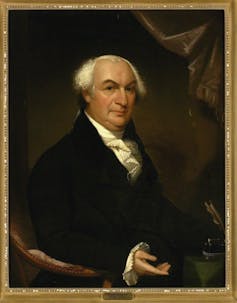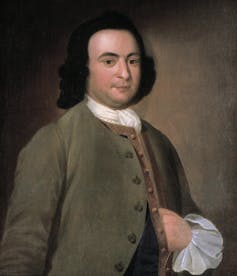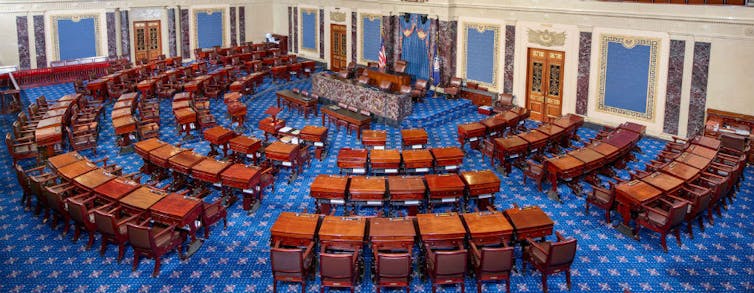[ad_1]
When the Supreme Courtroom dominated on March 4, 2024, that former President Donald Trump may seem on state presidential ballots for the 2024 election, it didn’t tackle an concept that appeared easy and compelling when Justice Brett Kavanaugh raised it in the course of the Feb. 8, 2024, oral arguments within the case:
“What about the concept that we must always take into consideration democracy, take into consideration the precise of the folks to elect candidates of their selection, of letting the folks determine?”
In essence, he was asking whether or not it could be higher to let the folks, slightly than a court docket or a state official, determine whether or not a controversial candidate ought to return to the White Home.
Kavanaugh had some extent. Below the Structure, the folks might be – and are – trusted to make an excellent many necessary choices.
However Kavanaugh additionally missed a key level that I realized in years of instructing concerning the presidency, the Structure and impeachment. Proper from the very starting of the nation, and persisting till at the moment, there have been guidelines that restrict the power of the folks to decide on their leaders.
The Constitutional Conference of 1787

Ezra Ames through Wikimedia Commons
The drafters of the Structure already had the dialogue Kavanaugh was making an attempt to begin in the course of the oral arguments.
In July 1787, the delegates to the Constitutional Conference, the place the Structure was written, had been discussing impeachment. Gouverneur Morris – a Pennsylvania delegate who wrote the preamble to the Structure, together with its opening phrase, “We the Individuals of america” – made an argument Kavanaugh’s query would echo 237 years later.
When discussing whether or not it needs to be potential for Congress to take away the president, Morris stated no.
The folks may determine for themselves, he stated. Making the president topic to impeachment, Morris stated, “will maintain him in such dependence that he can be no verify on the Legislature, (nor) a agency guardian of the folks and of the general public curiosity.” With common nationwide elections, Morris stated, a flawed chief govt might be faraway from workplace by the voters. Morris added, “In case he needs to be reelected, that can be ample proof of his innocence.”

Dominic W. Boudet after John Hesselius through Wikimedia Commons
However George Mason, a Virginia delegate and slaveholder who championed the concept for the Invoice of Rights, was prepared with a response. Declaring that true and honest elections had been key to the brand new nation’s success, Mason famous that if legal conduct by some future president concerned corruption of the election course of, the folks might need hassle deciding the offender’s destiny in a subsequent election:
“Shall any man be above Justice? Above all shall that man be above it, who can commit essentially the most intensive injustice? … Shall the person who has practised corruption and by which means procured his appointment within the first occasion, be suffered to flee punishment, by repeating his guilt?”
Others chimed in with comparable replies: Benjamin Franklin of Pennsylvania; James Madison of Virginia, a future president; Elbridge Gerry of Massachusetts, a future vice chairman; and Edmund Randolph of Virginia, a future U.S. lawyer common and secretary of state.
The data of the Constitutional Conference say this on the conclusion of that part of debate:
“Mr. Gouverneur Morris’s opinion had been modified by the arguments used within the dialogue. … Our Government was not like a Justice of the Peace having a life curiosity, a lot much less like one having an hereditary curiosity in his workplace. He could also be bribed by a higher curiosity to betray his belief … The Government ought due to this fact to be impeachable for treachery; Corrupting his electors, and incapacity.”
The result of that dialogue resulted within the first of a number of guidelines that forestall the American folks from selecting simply anybody because the president.
Key restrictions
Part 3 of Article 1 of the Structure is essentially the most direct results of the controversy between Morris and Mason. It says that folks, together with the president, who’re impeached and convicted might be barred from workplace.
Part 1 of Article 2 of the Structure imposes extra limits. It declares that some folks merely can’t be president – these not born U.S. residents, these below age 35 and people who have lived lower than 14 years of their lives within the U.S.
Eight a long time later, Congress and the states agreed so as to add a brand new restriction: Part 3 of the 14th Modification, ratified in 1868, says these looking for to carry federal and state places of work who’ve beforehand taken an oath to help the Structure might not have attemped to subvert or overthrow the Structure.
And in 1951, the twenty second Modification to the Structure was ratified, declaring that no person who had been president for 2 phrases may develop into president once more.
All of those guidelines stand in the best way of merely “letting the folks determine,” as Kavanaugh urged. Strictly talking, these guidelines aren’t democratic. However they’re meant to guard democracy itself.

U.S. Senate through Wikimedia Commons
Democracy isn’t at all times democratic
There are many provisions within the Structure that run counter to easy democracy.
The Senate and the Electoral Faculty give additional energy to states with comparatively small populations.
No Congress – even one whose members had been every elected by large majorities – can cross a regulation abridging freedom of faith or freedom of speech. If a Congress had been to cross such a regulation, the Supreme Courtroom, which has been known as the nation’s least democratic department, may declare it unconstitutional.
Democratic majorities in America are each empowered and constrained by the Structure. The founders wished the desire of the folks to be heard and revered however by no means given absolute energy. Absolute energy of any type was to be checked by a sophisticated set of prohibitions and procedures.
Kavanaugh was clever to name consideration to the truth that in a democracy, the preferences of the folks get a excessive stage of deference. Voters actually can decide the conduct and character of Donald Trump – and plenty of have finished so, each favorably and unfavorably.
However George Mason was additionally proper. When politicians corrupt the electoral course of, or strive to take action, it makes little sense to make use of elections because the mechanism to repair the issue.
The constitutional provisions for impeachment and the 14th Modification clarify that people who find themselves discovered responsible of significant wrongdoing whereas in workplace, or violate an oath to help the Structure, are ineligible to carry excessive workplace thereafter. Briefly, the folks can’t select a Senate-convicted official or an oath-breaking insurrectionist, even when they wish to.
America’s Structure has lengthy acknowledged that the preservation of the republic might, in some instances, require the disqualification of candidates and officeholders who commit crimes whereas in positions of energy or take part in revolt in opposition to the very authorities they’ve sworn to serve.
The Supreme Courtroom has sidestepped the query of whether or not Trump’s actions disqualify him from workplace and declared as an alternative that Congress should make that willpower, below the varied constitutional restrictions that live on about who’s allowed to function president. The sensible impact of its choice can be to let the folks determine this important query within the coming presidential election.
[ad_2]
Source link




